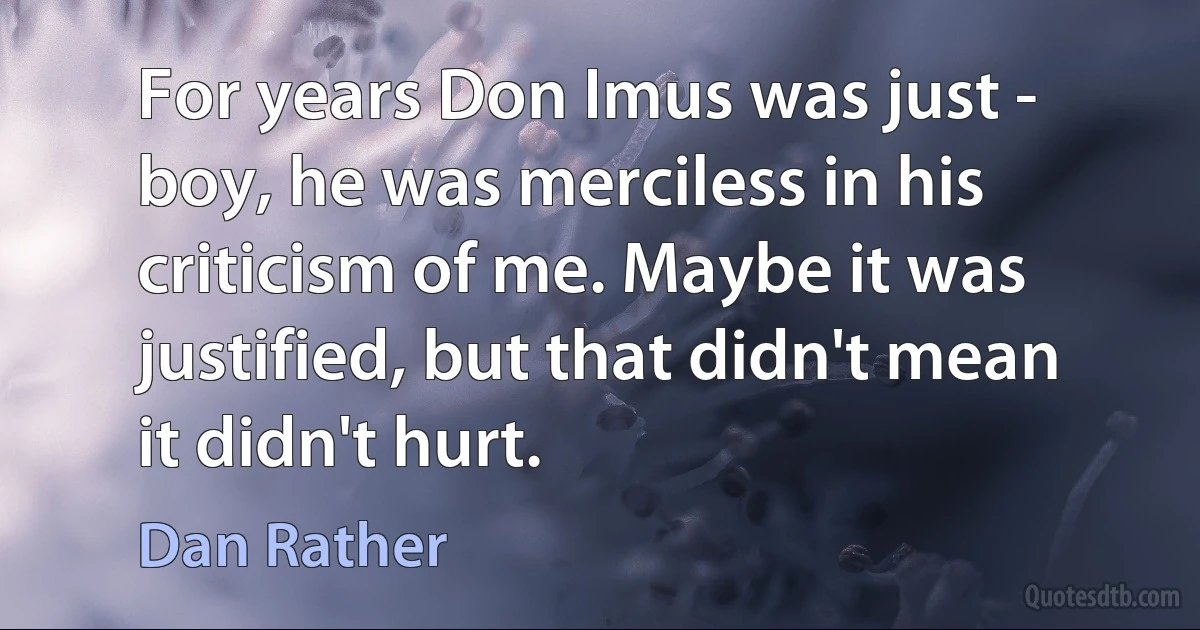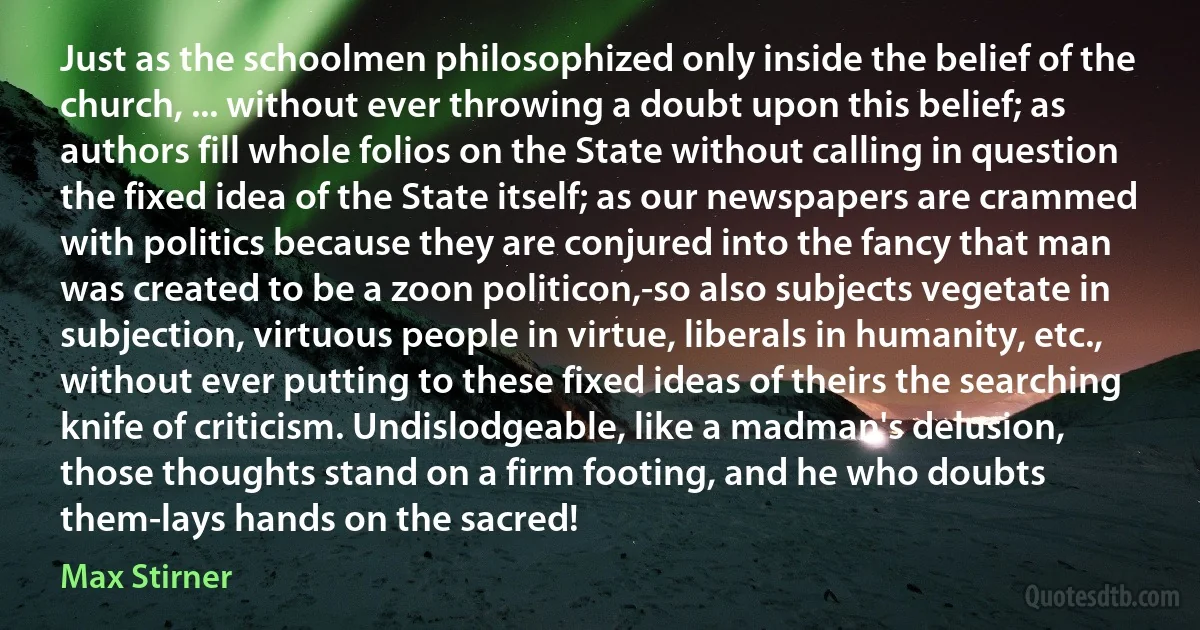Criticism Quotes - page 21
The press was full of outraged criticism of the community charge from Conservative supporters. What hurt me was that the very people who had always looked to me for protection from exploitation by the socialist state were those who were suffering most. These were the people who were just above the level at which community charge benefit stopped but who were by no means well off and who had scrimped and saved to buy their homes.

Margaret Thatcher
Especially do the evils of the times, the folly and blindness of the masses, the injustice of rulers, the perversion of religion in unfruitful ceremonialism work upon the souls more finely attuned as a stimulus and spur; the feeling of the evil stirs their moral judgment or conscience to the criticism of the existing situation, and out of the criticism there grows for them the new ideal which impresses itself upon them as the truth that has the power to save from the corruption of the time; and while they first raise themselves to this ideal, they also win power and courage to draw others toward it. Thus they become the proclaimers of a higher truth which, over against the antecedent error, appears as something wholly new, as a revelation from above, but which is, indeed, nothing else than a higher development of the impulse toward truth and righteousness that is a natural quality of the human mind.

Otto Pfleiderer
Of course, neither the United States nor Europe are perfect in adherence to our ideals, nor do we claim to be the sole arbiter of what is right or wrong in the world. We are human, after all, and we face difficult choices about how to exercise our power. But part of what makes us different is that we welcome criticism, just as we welcome the responsibilities that come with global leadership.

Barack Obama
Every presentation of philosophy, whether oral or written, is to be taken and can only be taken in the sense of a means. Every system is only an expression or image of reason, and hence only an object of reason, an object which reason-a living power that procreates itself in new thinking beings-distinguishes from itself and posits as an object of criticism. Every system that is not recognized and appropriated as just a means, limits and warps the mind for it sets up the indirect and formal thought in the place of the direct, original and material thought.

Ludwig Andreas Feuerbach
Nothing touches a work of art so little as words of criticism : they always result in more or less fortunate misunderstandings. Things aren't all so tangible and sayable as people would usually have us believe; most experiences are unsayable, they happen in a space that no word has ever entered, and more unsayable than all other things are works of art, those mysterious existences, whose life endures beside our own small, transitory life.

Rainer Maria Rilke
The "old maid” with her repressed cravings for tenderness, sex, and propagation, is rarely quite free of ressentiment. What we call "prudery,” in contrast with true modesty, is but one of the numerous variants of sexual ressentiment. The habitual behavior of many old maids, who obsessively ferret out all sexually significant events in their surroundings in order to condemn them harshly, is nothing but sexual gratification transformed into ressentiment satisfaction. Thus the criticism accomplishes the very thing it pretends to condemn.

Max Scheler
To a lesser degree, a secret ressentiment underlies every way of thinking which attributes creative power to mere negation and criticism. Thus modern philosophy is deeply penetrated by a whole type of thinking which is nourished by ressentiment. I am referring to the view that the "true” and the "given” is not that which is self-evident, but rather that which is "indubitable” or "incontestable,” which can be maintained against doubt and criticism.

Max Scheler
No criticism can be brought against a branch of technical science from outside; no thought fitted out with the knowledge of a period and setting its course by definite historical aims could have anything to say to the specialist. Such thought and the critical, dialectical element it communicates to the process of cognition, thereby maintaining conscious connection between that process and historical life, do not exist for empiricism; nor do the associated categories, such as the distinction between essence and appearance, identity in change, and rationality of ends, indeed, the concept of man, of personality, even of society and class taken in the sense that presupposes specific viewpoints and directions of interest.

Max Horkheimer
[Responding to criticism from Dr. Hesse] Voodoo, Dr Hesse's piece de risistance', is case in point. Nobody knows it, everybody uses it as a paradigm of backwardness and confusion. And yet Voodoo has a firm though still not sufficiently understood material basis, and a study of its manifestations can be used to enrich, and perhaps even revise, our knowledge of physiology.

Paul Karl Feyerabend
The House of Commons has lifted our affairs above the mechanical sphere into the human sphere. It thrives on criticism, it is perfectly impervious to newspaper abuse or taunts from any quarter, and it is capable of digesting almost anything or almost any body of gentlemen, whatever be the views with which they arrive. There is no situation to which it cannot address itself with vigour and ingenuity. It is the citadel of British liberty; it is the foundation of our laws; its traditions and its privileges are as lively today as when it broke the arbitrary power of the Crown and substituted that Constitutional Monarchy under which we have enjoyed so many blessings.

Winston Churchill
No Socialist Government conducting the entire life and industry of the country could afford to allow free, sharp, or violently-worded expressions of public discontent. They would have to fall back on some form of Gestapo, no doubt very humanely directed in the first instance. And this would nip opinion in the bud; it would stop criticism as it reared its head, and it would gather all the power to the supreme party and the party leaders, rising like stately pinnacles above their vast bureaucracies of Civil Servants, no longer servants and no longer civil. And where would the ordinary simple folk-the common people, as they like to call them in America-where would they be, once this mighty organism had got them in its grip?

Winston Churchill
What we should do, I suggest, is to give up the idea of ultimate sources of knowledge, and admit that all knowledge is human; that it is mixed with our errors, our prejudices, our dreams, and our hopes; that all we can do is to grope for truth even though it be beyond our reach. We may admit that our groping is often inspired, but we must be on our guard against the belief, however deeply felt, that our inspiration carries any authority, divine or otherwise. If we thus admit that there is no authority beyond the reach of criticism to be found within the whole province of our knowledge, however far it may have penetrated into the unknown, then we can retain, without danger, the idea that truth is beyond human authority. And we must retain it. For without this idea there can be no objective standards of inquiry; no criticism of our conjectures; no groping for the unknown; no quest for knowledge.

Karl Popper
A man who makes assertions, or draws conclusions, regarding any given case, ought to be competent to investigate it. He has no right to throw the onus on others, declaring it their duly to prove him right or wrong. His duty is to demonstrate the truth of that which he asserts, or to cease from asserting. The men he calls upon to consider and judge have enough to do with themselves, in the examination, correction, or verification of their own views. The world little knows how many of the thoughts and theories which have passed through the mind of a scientific investigator have been crushed in silence and secrecy by his own severe criticism and adverse examination; that in the most successful instances not a tenth of the suggestions, the hopes, the wishes, the preliminary conclusions have been realized.

Michael Faraday



